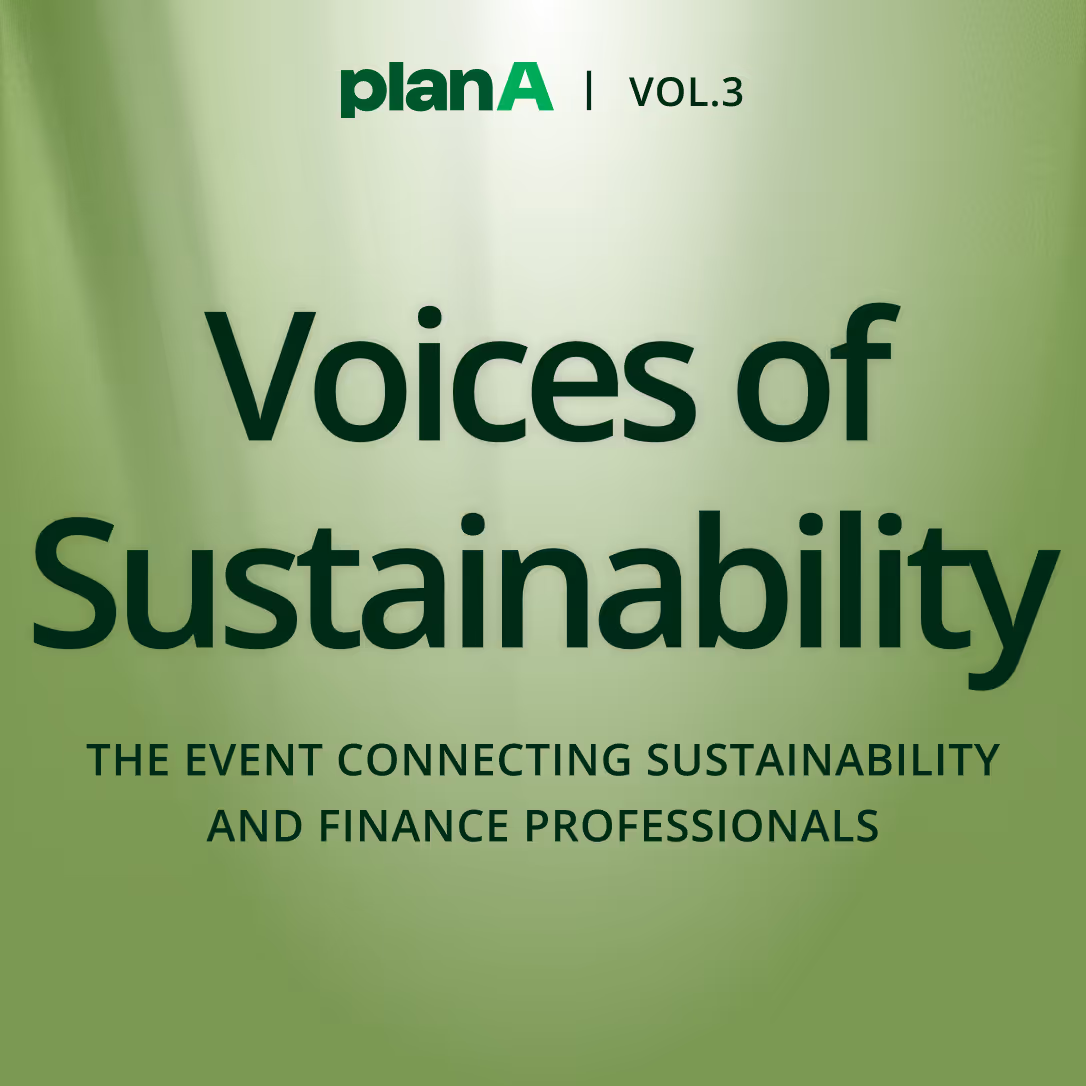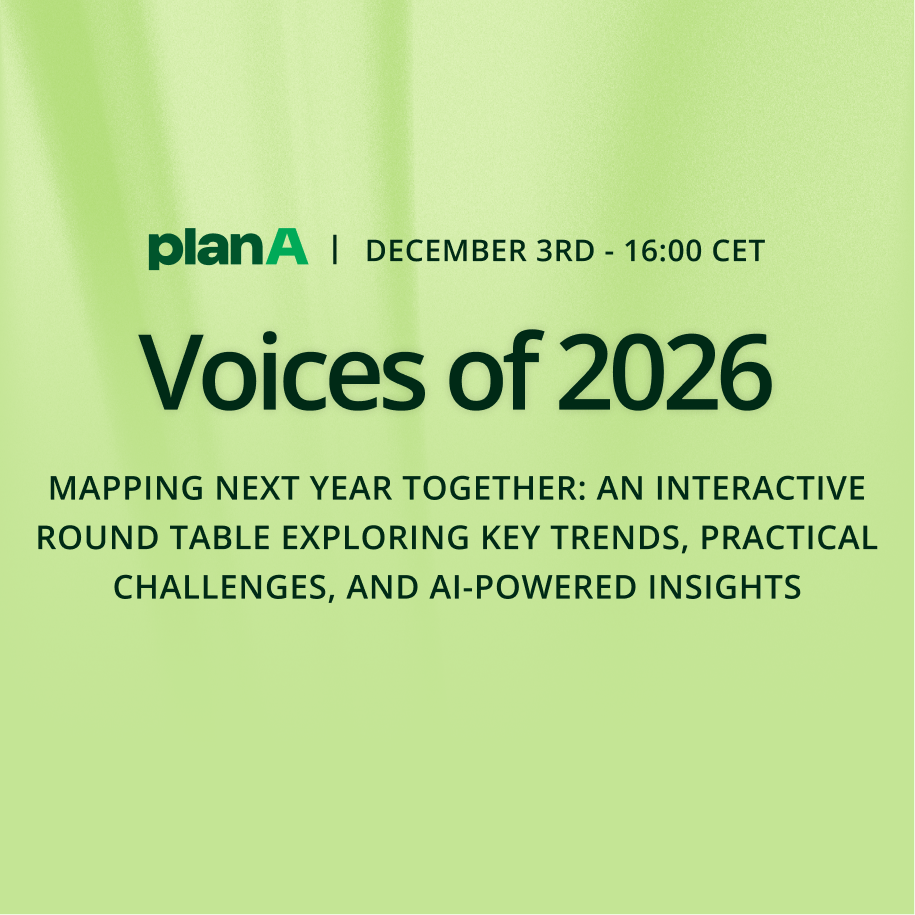In ein paar Worten,
In der Oktobersitzung von Voices of Sustainability ging es darum, wie Fachleute für Nachhaltigkeit und Berichterstattung das letzte Quartal des Jahres optimal nutzen können. Die Diskussion konzentrierte sich auf die Umwandlung der Berichterstattung in greifbare Dekarbonisierung , die Verbesserung der Datenqualität und die Nutzung von Beschaffung und Soft Power, um die Wirkung über die Lieferketten hinweg zu steigern.
Die Teilnehmer tauschten sich über Strategien aus, um die Berichtspflichten mit sinnvollen Reduktionsmaßnahmen in Einklang zu bringen, diskutierten über neue Herausforderungen durch politische Veränderungen und KI-bedingte Emissionen und reflektierten darüber, wie Unternehmen - und nicht nur die Regulierungsbehörden - zu den Haupttreibern von Klima werden.
Wichtigste Erkenntnisse
Daten & Berichte
- Verbessern Sie die Genauigkeit schrittweise: Betrachten Sie Datenqualität als eine Reise, nicht als ein Ziel. Konzentrieren Sie sich auf schrittweise Verbesserung statt auf Perfektion.
- Erwarten Sie mehr Transparenz: Die maschinenlesbare Berichterstattung (CSRD) wird Ungereimtheiten aufdecken und 2025-2026 zu einer größeren Rechenschaftspflicht führen.
Lieferkette & Beschaffung
- Gehen Sie strategisch vor: Setzen Sie Prioritäten bei den Lieferanten, deren Klima hinter den Ihren zurückbleiben, und richten Sie Ihre Kontaktaufnahme nach den Vertragsverlängerungen aus.
- Nutzen Sie die Beschaffung: Arbeiten Sie eng mit den Beschaffungsteams zusammen, um Klima in Verträge und Beschaffungsentscheidungen einzubinden.
Taktik Dekarbonisierung
- Wenden Sie sanfte Macht an: Nutzen Sie kostenlose Anreize - wie z.B. zusätzliche Sichtbarkeit oder Gesprächszeit für Klima Lieferanten - um den Wandel voranzutreiben.
- Arbeiten Sie zusammen und stimmen Sie sich ab: Treten Sie Koalitionen wie RE100 oder dem 24/7 Carbon-Free Energy Compact bei, um die Wirkung zu verstärken und klare Erwartungen in Ihrer Wertschöpfungskette zu setzen.
Umsetzbare Schritte & Ressourcen
- Zeichnen Sie die Prioritäten der Zulieferer auf:
Erstellen Sie eine Matrix der Zulieferer auf der Grundlage ihrer Ausrichtung, ihres Engagements und ihres Einflusses, um festzustellen, wo das Engagement die größte Wirkung haben wird. - Nutzen Sie das Timing:
Verfolgen Sie die Termine für Vertragsverlängerungen, um proaktive Dekarbonisierung und Datenanforderungen zu planen. - Verbessern Sie die Reduzierung von Scope 2 :
Erkunden Sie Quick Wins wie Zertifikate für erneuerbare Energien (RECs) oder gemeinsame Investitionen in erneuerbare Energien, um die Emissionen von Lieferanten sofort zu reduzieren. - Treten Sie Kooperationsgruppen bei:
- Verabschieden Sie verantwortungsvolle KI-Standards:
- Hugging Face AI Nachhaltigkeitsstandards
- Informieren Sie sich über den Leitfaden für das öffentliche Beschaffungswesen in Großbritannien zum Thema "Most Advantageous Tender" (günstigste Ausschreibung) für Klima Entscheidungsrahmen.
- Setzen Sie weiche Anreize:
Richten Sie die Lieferanten nach ihren Klima ein, geben Sie denjenigen, die Klima haben, mehr Zeit für Pitches oder weisen Sie sie als bevorzugte Partner aus - das kostet nichts, erzeugt aber sinnvollen Druck. - Vergleichen Sie Ihre Fortschritte:
Testen Sie das neue kostenlose Nachhaltigkeits-Benchmarking-Tool von Plan A(Link wird in der Folgemail mitgeteilt), um die Fortschritte Ihres Unternehmens zu vergleichen und Verbesserungsbereiche zu identifizieren.
Registrieren Sie sich für kommende Sessions
Nehmen Sie an zukünftigen Voices of Sustainability-Veranstaltungen teil, um weiterhin von Ihren Kollegen zu lernen, Ideen auszutauschen und praktische Tools für die Dekarbonisierung und Berichterstattung zu erhalten.
Registrieren Sie Ihr Interesse für kommende Sitzungen




.jpg)
